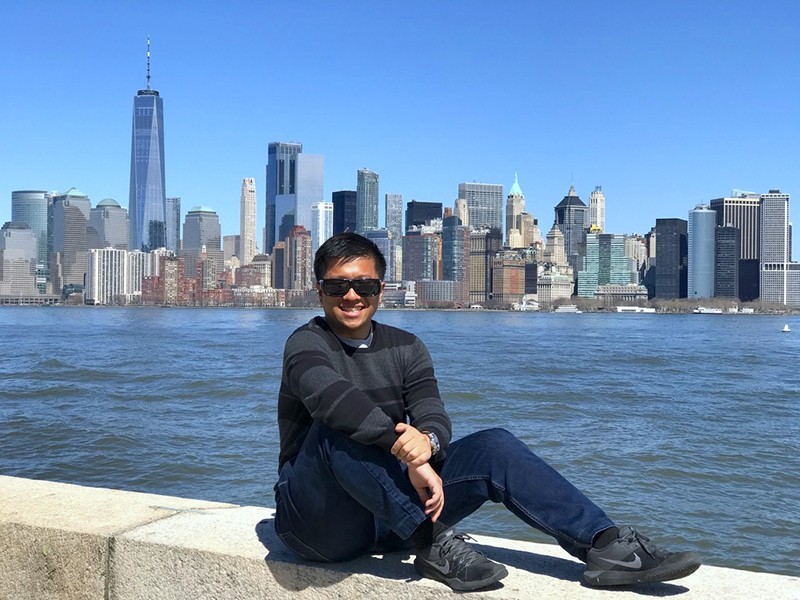As soon as you meet Calvin Woo, it’s easy to tell where his interests lie. As part of ASB’s MBA Class of 2019, Calvin’s unconventional background centers around entrepreneurship and social impact, two of his long-term passions. He formed his entrepreneurial mindset at age 11, when he asked his parents to buy him a gift and they told him he had to work for it instead. “Nothing comes free,” he jokes.
Still, he is grateful that, as the firstborn son in a Chinese Malaysian family, his parents allowed him to pursue a career in social enterprise, though he credits this in part to his adolescent negotiation skills. “I didn’t have that pressure of being an engineer, doctor, or whatever,” he says. “They let me do what I wanted to do.”
Over his school breaks and during the summer months, Calvin took odd jobs at a family-friend’s logistics company, using his relative invisibility as a young kid within the firm to learn as much as he could about how the business worked. He talked to everyone who would listen, including interviewing truck drivers about their routes and driving strategies.
Through these inquiries, Calvin was employing the principles of Action Learning years before he would enroll at ASB. In this case, it was his way of learning how to build a company. He started his first business as an undergraduate, printing t-shirts for clubs and organizations at his school. Through this experience, he learned invaluable skills such as negotiation and stakeholder management. Most importantly, he learned how to overcome the anxiety that comes with building something on his own.
“It’s about finding the right opportunities and jumping on them,” he advises. “Act now and fear later.” After this first taste of running a business, Calvin knew he could never work for anyone else. He was only unsure of what kind of business to start until he discovered the world of social enterprise. An English Education major, Calvin was concerned about the educational landscape in Malaysia and wanted to improve it.
In the library, he flitted between the education and business sections, unsure how to connect the two disciplines. A conference at MaGIC first inspired him to explore the bridge between social impact and business. There, he learned about the organization’s programs, eventually enrolling in its 2015 bootcamp where he met several like-minded individuals leveraging business to solve social issues. Not only did he learn a lot, but he gained access to a valuable community.
The first social enterprise he worked with as the Head of Programs was an afterschool program targeting high-need Malaysian students between ages 15 and 17. The organization partnered with universities and training providers to give students better-quality ways to spend their time after school, as well address gaps in their learning not covered in a normal school day.
“We saw how education can be done differently,” Calvin says, reflecting on the experience. “We saw that there were limitations to what the government could provide, especially in quantitative and analytics skills, which was one reason why I came to ASB.” And when Calvin started a social enterprise on his own, he encountered another issue that affected every double-bottom-line organization: he was unsure whether to register as a for-profit or non-profit entity.
This binary classification system didn’t make sense for his organization, causing him to wrestle with an identity crisis and eventually shutter the business. To Calvin, social enterprise means much more than providing earned income for otherwise traditional non-profit organizations. It’s a holistic way of thinking about business that takes a larger set of stakeholders into account, with the primary social mission fitting neatly together with a secondary financial mission.
However, he recognizes that balancing the two goals is an art, and a tricky one at that. The solution? “There should be systems in place that support the growth of these types of organizations,” Calvin says. “Social enterprises face a lack of clarity arising from their legal classification. The current policy doesn’t favor them at all.” After earning his MBA, Calvin hopes to help create a legal structure that will support social enterprises, enabling them to pursue these dual purposes.
He believes the ASB curriculum will prepare him for this work by teaching him to navigate between big-picture thinking and addressing everyday business challenges. “A few classes helped shape my mental model, such as Joe Santos’s global management course and Loredana Padurean’s entrepreneurship framework,” he notes. “I can now look at the same issues from multiple perspectives.”
Calvin also sees ASB’s diversity as a unique learning opportunity. For him, interacting with people from different countries was a way to learn more about himself. “I now feel more Malaysian than I had before,” he notes with a touch of humor. He has learned to embrace differences of opinion among his classmates, claiming that unique perspectives provide a more comprehensive view of a problem and result in more interesting and productive discussions.
His favorite example of this is from working in a team with classmates from different backgrounds and nationalities on an Action Learning project for Bangkok Bank. He credits the success of the project to the fact that some of the team members had banking or financial modeling experience, while others had a more entrepreneurial background. At the project’s conclusion, the bank’s president considered implementing several of the team’s recommendations.
“ASB is unique because the school forces a diverse group of individuals into a common working and living space, so we are able to engage more closely,” Calvin says. “Building these deep relationships is invaluable in itself, because it got me to where I am today.”





